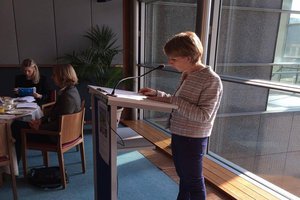News
“Unemployment: what solutions in border regions?”
June 2016
On 26 May 2016, Anne Sander, MEP and Vice-President of the MOT, chaired the fourth meeting of the working group on cross-border cooperation that she has coordinated at the European Parliament since June 2015. Around 40 experts, MPs, civil servants, staff and representatives of interest groups came together to discuss the solutions to unemployment in border regions.
Barely 1% of the economically active population crosses a border to go to work
Cross-border workers constitute 0.6% of economically active people in Europe. At the same time, unemployment in the EU is close to 9%. "It is common sense that in border regions people should be able to go and work in the neighbouring country if unemployment is lower there. Unfortunately, this mobility is still too marginal," Anne Sander points out. It is striking in the case of Alsace and Baden Württemberg, with 101,000 job-seekers on the French side and a shortage of qualified labour on the German side.
Practical, regulatory and ideological obstacles
There are many obstacles: language, lack of recognition of professional qualifications, cultural differences, regulatory constraints, lack of information, etc. Ideological barriers also persist. "For some people, 'cross-border work' is synonymous with 'unfair competition between workers' and 'social dumping'. The abuses associated with the status of cross-border worker have stigmatised worker mobility in Europe. Lastly, for those lucky enough to have found a job on the other side of the border, the struggle is not over!" A multitude of administrative annoyances remain: the headache of pensions, tax, social rights and the random reinstatement of border controls.
Mobility as an opportunity
The EU cannot resolve all of the problems as many of the obstacles come within the competence of national governments and local authorities. But if Europe succeeds in changing mentalities so that people regard mobility as an opportunity rather than a threat, it will have played its role effectively.

